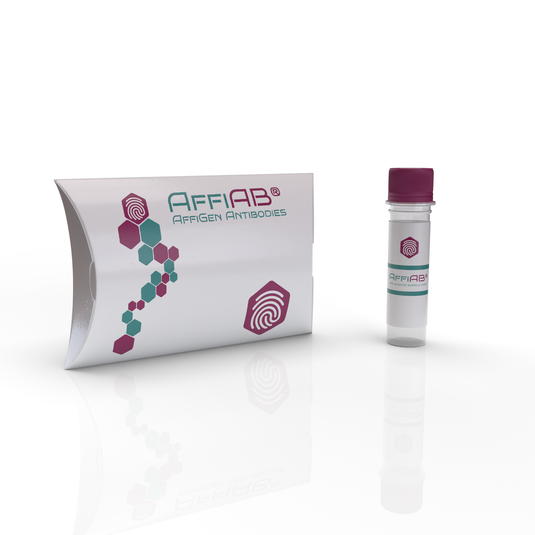AffiAB® Goat Anti-CANX Polyclonal IgG Antibody
Our Goat Anti-CANX Polyclonal IgG Antibody is a reliable and powerful tool for scientists working in immunology and cancer research. This antibody is highly specific and offers researchers an efficient method of detecting CANX protein expression.
Host: Goat
Species: Human
Description:
Goat Anti-CANX Polyclonal IgG Antibody is a high-quality research-grade antibody that is specific to the CANX protein. The CANX protein, also known as calnexin, is a calcium-binding protein that is involved in protein folding and quality control in the endoplasmic reticulum (ER) of eukaryotic cells. This antibody is raised in goats and purified from serum using protein A affinity chromatography. It has been validated for use in various applications such as Western blotting, immunoprecipitation, and immunohistochemistry. With its high sensitivity and specificity, this antibody is an excellent tool for studying the function of CANX in various cellular processes and diseases.
Gene Identifier/Accession Number: ENSG00000127022
Form: N/A
Concentration: 2 mg/mL
Type: Primary
Clonality: Polyclonal
Isotype: IgG
Conjugation: Unconjugated
Application: Western Blot, Immunofluorescence, Immunohistochemistry PARAFFIN PROTOCOL , Immunohistochemistry FROZEN
Storage: For continuous use, store at 2-8 °C for one-two days. For extended storage, store in -20 °C freezer. Working dilution samples should be discarded if not used within 12 hours.
Special instructions: The antibody solution should be gently mixed before use.
Goat Anti-CANX Polyclonal IgG Antibody
The Goat Anti-CANX Polyclonal IgG Antibody represents a significant advancement in the field of cell biology and molecular research. Targeting Calnexin (CANX), a key protein chaperone in the endoplasmic reticulum, this antibody is pivotal for studies related to protein folding, calcium signaling, and cellular stress responses. This article delves into the characteristics, applications, and importance of the Goat Anti-CANX Polyclonal IgG Antibody in contemporary research.
Understanding Goat Anti-CANX Polyclonal IgG Antibody
Production and Specificity:
This antibody is produced by immunizing goats with a synthetic peptide corresponding to a region of the CANX protein. The resulting polyclonal IgG antibodies are characterized by their ability to recognize various epitopes on CANX, enhancing detection sensitivity and specificity.
Advantages of Goat-Derived Antibodies:
Goat-derived antibodies offer high antigen sensitivity and greater yield. Their robust immune response makes them suitable for detecting proteins at low concentrations, a crucial feature in detailed protein studies.
Applications in Biomedical Research
1. Protein Folding Studies:
Calnexin is integral to proper protein folding within the endoplasmic reticulum. The Goat Anti-CANX Polyclonal IgG Antibody is used to study these processes, contributing to our understanding of cellular homeostasis and protein maturation.
2. Cell Stress Response Research:
In studying cellular responses to stress, particularly endoplasmic reticulum stress, this antibody is invaluable. It helps identify the role of CANX in various stress-related pathways, which is crucial in understanding diseases like cancer and neurodegeneration.
3. Immunohistochemistry (IHC) and Immunocytochemistry (ICC):
For visualizing CANX expression in tissue samples and cultured cells, this antibody is a key tool. It helps in understanding the spatial distribution and level of CANX under different physiological and pathological conditions.
4. Western Blotting:
In Western blotting, the antibody is used to detect CANX proteins, aiding in the analysis of protein expression levels and post-translational modifications under various experimental conditions.
5. Immunoprecipitation (IP):
The Goat Anti-CANX Polyclonal IgG Antibody can also be used in IP to isolate CANX protein from complex biological samples, facilitating the study of its interacting partners and functions.
Conclusion
The Goat Anti-CANX Polyclonal IgG Antibody is a vital tool in the exploration of cellular mechanisms and disease pathologies. Its role in studying protein folding, stress responses, and cellular signaling underscores its importance in biomedical research. With the ongoing advances in molecular biology techniques, this antibody will continue to be a cornerstone in unraveling the complexities of cellular functions.

